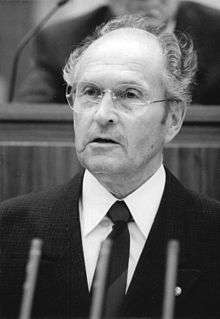Oskar Fischer (politician)
Oskar Fischer (19 March 1923 – 2 April 2020) was an East German politician of the ruling Socialist Unity Party (SED) who served as minister of foreign affairs of the German Democratic Republic from 1975 to 1990.[1][2][3] He previously worked in the secretariat of the central committee of the communist party, and became a member of the SED central committee in 1971.
Oskar Fischer | |
|---|---|
 | |
| Minister of Foreign Affairs of the German Democratic Republic | |
| In office 3 March 1975 – 12 April 1990 | |
| Prime Minister | Horst Sindermann Willi Stoph Hans Modrow |
| Preceded by | Otto Winzer |
| Succeeded by | Markus Meckel |
| Personal details | |
| Born | 19 March 1923 Aš, Czechoslovak Republic |
| Died | 2 April 2020 (aged 97) Berlin, Germany |
| Nationality | German |
| Political party | Socialist Unity Party of Germany |
Career
Fischer served as East Germany's ambassador to Bulgaria for four years.[4] He was deputy minister of foreign affairs from 1965 to 1975.[4][5] He was named as a member of the Central Committee of the Socialist Unity Party in 1971.[4][6] He was appointed as minister of foreign affairs on 3 March 1975.[7] Fischer replaced Otto Winzer in the post, who had been removed from office due to ill health.[6]
Fischer was the first member of the East German cabinet to visit Pope John Paul II at the Vatican in 1978.[8] Fischer also officially visited a number of European states, including Austria, Denmark and the Netherlands.[9] Fischer's tenure lasted until 12 April 1990.[10]
Following the fall of communism, Fischer led a private life from 1990 and declined all interview requests. In 2000, Fischer briefly served as one of several informal advisors to Gabriele Zimmer.[11] He died on 2 April 2020, aged 97.[12]
References
- "Document 23" (PDF). George Washington University. Retrieved 4 September 2012.
- "Leaders of East Germany". Terra. Retrieved 5 September 2012.
- "Foreign Affairs". Rulers. Retrieved 5 September 2012.
- "Oskar Fischer". Der Spiegel. 27 January 1975. Retrieved 4 September 2012.
- "Treaty between the Polish People's Republic and the German Democratic Republic concerning the delimitation of the continental shelf in the Baltic Sea" (PDF). UN. Retrieved 4 September 2012.
- "E. German Post Goes to Fischer". Pittsburgh Post Gazette. Berlin. NYT. 21 January 1975. Retrieved 3 September 2012.
- "Die Tätigkeit der "Gruppe Ulbricht" in Berlin von April bis Juni 1945" German Federal Archives. Retrieved 4 September 2012 (in German)
- "Pope meets East German, Names Aide". The Milwaukee Journal. The Vatican City. 29 January 1979. Retrieved 3 September 2012.
- Ofer Feldman; Christ'l De Landtsheer (1998). Politically Speaking: A Worldwide Examination of Language Used in the Public Sphere. Greenwood Publishing Group. p. 35. ISBN 978-0-275-96122-0. Retrieved 28 January 2013.
- Monika Zimmermann (1994). Was macht eigentlich ...?. Ch. Links Verlag. p. 65. ISBN 978-3-86153-064-0. Retrieved 4 September 2012.
- "Zimmers Altkader". Der Spiegel. 2 July 2001. Retrieved 4 September 2012.
- Langjähriger DDR-Außenminister Oskar Fischer gestorben(in German)